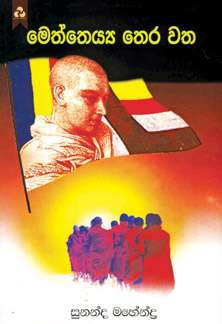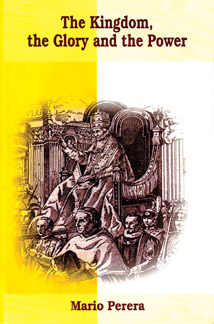|
Book Review
Chronicling the western monk
Title: Metteyya Thera Vatha
Author: Sunanda Mahendra
Genre: Biographical fiction
Page count: 135
Price: Rs 250
Publisher: Dayawansa Jayakody Publishers
The concept of 'western monk' is still fresh to Sri Lanka. This is
precisely because the local biographical research of the western monk is
shockingly inadequate. Professor Sunanda Mahendra's latest work Metteyya
Thera Vatha, therefore, seems to be a pioneering effort.
 This is about Charles Henry Allen Benett who is not much known in the
Lankan circles. To chronicle someone born in 1872 is no cakewalk.
Mahendra has consulted several books and journals, and has tweaked raw
research matter into a beautiful creative work. This is about Charles Henry Allen Benett who is not much known in the
Lankan circles. To chronicle someone born in 1872 is no cakewalk.
Mahendra has consulted several books and journals, and has tweaked raw
research matter into a beautiful creative work.
This is a creative work, I emphasize, so don't expect it to be
hundred-percent accurate, because it cannot possibly be. Not much
information is available on this monk who existed long time ago. There
are more important things than accuracy: inspiration and influence.
Why is a western monk's life so important to Sri Lanka, one would
question.
This world is not short of philosophers who claim the life as
wretched. The world is also full of major religious institutions busy
with the conversion campaign. But then there is a silent group not much
known. They are the truth-seekers - just like the protagonist in Hesse's
Siddhartha - who get out into the street to seek happiness. The western
world is full of 'pleasure', and for that matter these monks resemble
Prince Siddhaththa who left luxuries for happiness. The western monk
under our discussion is born a catholic in a European country, get to
know Theravada Buddhism, and become a monk to experience the ultimate
happiness.
Professor Mahendra's work is very much appreciable as it offers
insights to a Buddhist scholar born in the Western hemisphere. Famous
western monks who have been to Sri Lanka include Yogavachara Rahula,
Ajahn Sumedho, Ajahn Brahm and Bhikkhu Bodhi. Allan Benett, who later
became Ven Ananda Metteyya Thera, is one significant figure in this
lineage.
All these westerners discovered Buddhism as a result of seeking
happiness. Buddhism, therefore, seems to be the only religion that
provides a clear-cut path to happiness.
In the prologue-type start, Mahendra introduces a journalist in
search of Allan Benett. The story unfolds in the way Benett narrates the
story to the journalist. There is a little technical difficulty of
understanding the sequence of events, especially the letters, caused by
paragraph separation. But that hardly hinders the smooth flow.
Benett's life story is written in local flavour. Though the
protagonist is British, author reminds us the fact that humanity or
human nature is sans barriers such as country, religion and culture.
When Allan's sister whispers of their mother's death, her tone brings us
to our way of culture. In that way Mahendra makes the character close to
our heart. He wins the trust of our hearts, in fact.
Mahendra bravely, though doesn't seem straight, questions our
ideology of western scholarship. In a dialogue between two Whites, the
elder advises the younger to go to an eastern country to have firm
scholarship. Sri Lanka ironically is full of scholars worshipping the
idol of western scholarship.
Through Mahendra's simple words, I can picture Allen Bennett looking
at his mother's death with a feeling of indifference. You must not liken
this to the protagonist of Albert Camus' Outsider. This is not
existentialism or any other nonsense. This shows deeper understanding
and acceptance of life's ways.
English translation of some parts is not really necessary, since the
work is meant for the Sinhala reader. It only distracts the reader,
since h/she doesn't look for an English lesson. There is one instance
where monk Ananda Metteiya asks if the meal is vegetarian. This is not
strange in modern urban-based monk community, vegetarianism being a
noble concept of moderate living. However in principle the monks are
instructed to be content with whatever they are given.
Professor Mahendra's book is a comprehensive study of the initial
stages of Buddhist propagation during the colonial times in the eyes of
Allan Benett. It describes how Benett was led to take up oriental
studies and gradually turning to Buddhism - no one forcibly converted
him. How he starts seeing life in the Buddhist perspective of
impermanence. How his wise friends enrich his knowledge and vision. And
you are exposed to a rich storage of the western Buddhism evolution.
If you say the work is interesting, that belittles the work. The work
is immensely inspiring, and this is the type we need to read in today's
world full of chaos and quakes. This is the type that wholeheartedly
offers crutches to stand alone in a heap of intellectual garbage.
The West has now opened the forum and leading Buddhist figures are
under discussion: Ajahn Chan, Ajahn Mun, Ajahn Maha Boowa, Ajahn Jagaro,
Ajahn Brahm, Ajahn Geoff, Bhikkhu Bodhi, Bhikkhu Dhammadarsa, Shravasti
Dhammika Thera and many others. Some of these monks have not set foot in
Lanka, but as a country where the majority follows Theravada Buddhism,
we should be aware of these monks - at least for inspiration. Their
teachings should be widely available to the Lankan audience in the
native language.
Metteyya Thera Vatha is priceless in this backdrop, and should be the
guiding light for the contemporary writer.
- Harsha Abeysekara
Glory of divine power
Title: The Kingdom, the Glory and the Power
Author: Mario Perera
Publishers: Godage International Publishers
Page count: 368
Price: Rs 1250
It is very seldom we get books to read about lives relating to
formative days of priests and religious as seminarians or scholastics in
Sri Lanka. Even the books available for us to read are often authored
not by the clergy but those who had either left voluntarily the
Ministry, or those who had been compelled to leave priestly or religious
life by the circumstances. It is basically the lacuna of skilled writers
among the clergy that is the reason for this situation!
 The book The Kingdom, the Glory and the Power, authored by Mario
Perera, gives the reader an opportunity to dive into life and times of
this Roman scholastic and take a good look at the Formation Houses. The book The Kingdom, the Glory and the Power, authored by Mario
Perera, gives the reader an opportunity to dive into life and times of
this Roman scholastic and take a good look at the Formation Houses.
This is the second book I read and it was a good treat. It is a
welcome book to all parents who have given their sons and daughters to
understand what happens in between the entry and exit from the formative
houses.
The Bells of Silence by an ex-priest Noel Cruz was the first book I
had read long years ago.
It was quite surprising that the two authors have been members of OMI
Congregation and the only difference is one was an ex-priest and the
other an ex-scholastic, who had his priestly education both in Rome and
Sri Lanka.
Mario Perera the author of this book holds a doctorate and two
Master’s degrees from France and Rome. He had authored several books
both in English and French. All about Tea (in French), Peradeniya
Gardens (in French and English), Siripala the Cinnamon Peeler and Usages
and Customs of the Sinhalese (in French).
The book is divided into six main chapters and invites the reader to
grasp the trend woven like an unbroken tread around his journey.
Mario, the centre figure in this episode, narrates events in his life
as a scholastic both in Rome and Sri Lanka and introduce the OMI
Congregation, the Church, events of Sri Lankan political history, its
impact on Catholic Church and the Church-run schools prior to the
takeover.
In his preface Prof W S Karunatillake states this book, “probably the
most complete account of Catholic Seminary Life ever written.”
It is the belief of the author that he was prevented realizing his
and his parents’ dream by the Superior of the Scholasticate in Rome
whose attitude was hostile and unfavourable to him.
The impact created by that decision of the Superior in Rome had been
highly detrimental in realizing his aim, even in Sri Lanka.
A priest in Anuradhapura clashed with the author and he had
threatened to disrobe him. And Mario was removed from the list of
‘ordinandi’ at the last moment by the local Superior for the second
time.
The first occasion was while in Rome and his parents had come to
attend his ordination and they find their son is removed from the list!
It was undoubtedly a great humiliation. The mental pain, agony and
the trauma, he underwent.
Except one, the other two could not attain their goal. Even the one
who got ordained, eventually had to leave being a victim of
circumstances. He was a well recognized member of the OMI Preaching Band
and was in great demand.
The other one voluntarily left having seen how his brother Mario was
treated by the religious authorities. When the Rome authorities
prevented him being ordained, his brother who was with him in Rome had
told Mario: “Mari, you will never get a fair deal. Those Sri Lankan
superiors will go on their knees when the word ‘Rome’ is mentioned. The
fact of not having been ordained here will be a perpetual stigma on you.
They will use it to try to crush your spirit!”
The words of encouragement of Rev Fr Arulnesan OMI, one time his
Superior at the Oblate Scholasticate at Ampitiya, had given him the
necessary strength to leave the oblate life for good. Fr Arul made Mario
understand that the expected ok would never come to be ordained!
Fr Arulnesan had plainly told him not to run after the mirage. “If
you wait longer you will only be hurting yourself. Go now while you are
still relatively young. Do not waste your time here any more”. (Page
349) and he left and was the most favoured in the offices he worked!
The book, had it been written in Sinhala as well, would have helped
our parents understand better ‘the why’ their children offered for God’s
service are sent back home with the tag ‘no calling for a ‘celibate
life’’.
In my view books of this nature should come in vernacular if the
authors are serious in serving the community in which they live.
- Wiruma
|



